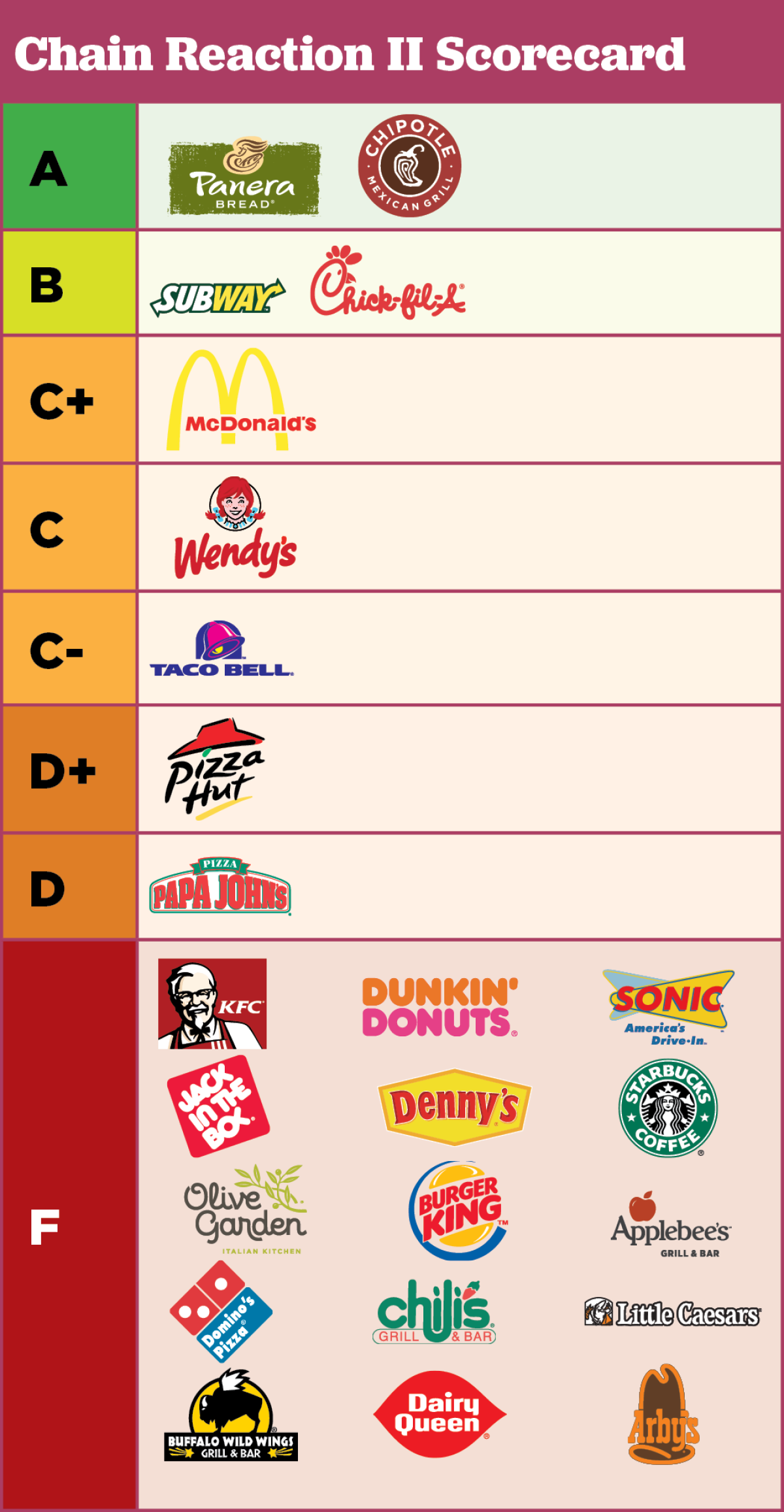Which fast-food chains served the meat and held the antibiotics?

A report released Tuesday by five consumer, environmental and public health groups showed progress in the fast-food industry.
Panera Bread and Chipotle Mexican Grill passed with flying colors, but KFC and Olive Garden were among the laggards in commitments to eliminate medically important antibiotics from their meat and poultry supply chains, according to a new report.
Strong progress nonetheless was made across the top 25 fast-food and casual dining retailers, suggesting that public pressure has helped slow the meat and poultry industry’s routine use of antibiotics that are critical to human health, according to the report released Tuesday by five consumer, environmental and public health groups.
“I think it shows consumers are driving change in how meat is produced,” said the report’s lead author, Sasha Stashwick, senior advocate for food and agriculture at the Natural Resources Defense Council.
Routinely feeding antibiotics to animals raised for food has been linked to the surge in resistant strains of bacteria that cause human illnesses, which adds about 23,000 additional deaths annually and boosts healthcare costs by $55 million, according to the U.S. Centers for Disease Control and Prevention.
Subway, which last year received an F rating in the report’s inaugural edition, rose to a B for its commitment announced earlier this year to eliminate antibiotics across its entire menu. Last year, the restaurant chain did not even respond to the survey and did not offer public details of its antibiotics policies, the groups reported. Starbucks, which again earned an F rating, has maintained a similar silence for two years running.
McDonald’s rose a half grade, to C-plus in the wake of its decision earlier this year to eliminate antibiotics from its chicken supply.

McDonald’s and Subway stand out as exceptions, said Kari Hamerschlag, deputy director of the food and technology program at Friends of the Earth, which helped compile the report.
“There definitely are laggards out there,” Hamerschlag said. “We think that’s going to change as these companies hear more from the public and shareholders.”
KFC and Olive Garden restaurants drew particular criticism for policies that still effectively allowed antibiotics to be abused, the groups said.
KFC, owned by Yum Brands, has said that it abides by the federal Food and Drug Administration guidelines, which discourage drug companies from labeling their antibiotics as appropriate for enhancing animal growth. By next year, the company said, “antibiotics important in human medicine will only be used to maintain chicken health, and only under the supervision and prescription of a licensed veterinarian.”
A KFC spokesperson said the company’s antibiotics policy “is currently being reviewed to determine the viability for our suppliers to go beyond the FDA guidelines for antibiotics usage.”
Activists say those voluntary guidelines allow food companies to continue feeding the same antibiotics under the guise of disease prevention.
Darden Restaurants Inc., which owns the Olive Garden chain, “has been misleading the public and shareholders about their antibiotics policy,” through that animal-health loophole, Hamerschlag said.
Officials from Darden were not immediately available for comment.
Activists estimate that about 40% of the chicken supply chain is or will soon be free of antibiotics that are important to human health. A commitment by KFC, said Stashwick, “could tip the industry over the 50% mark.”
But the beef and pork industries have been much slower in adopting more aggressive policies regarding antibiotic use.
Companies were rated on such factors as whether their programs were monitored by a third party, and included a timeline and updates on progress.
Besides KFC and Olive Garden, companies that received Fs this year were: Applebee’s, Arby’s, Buffalo Wild Wings, Burger King, Chili’s, Dairy Queen, Denny’s, Domino’s, Dunkin’ Donuts, IHOP, Jack in the Box, Little Caesars, Sonic and Starbucks.
Only Panera and Chipotle earned the top A grade, with a majority of companies clustered in the B and C range.
Compared to last year, twice as many companies — 16 of 25 — responded to requests to discuss their antibiotics programs with the groups, which also included Consumers Union, the Center for Food Safety and Food Animal Concerns Trust.
Follow me: @LATgeoffmohan
MORE FROM BUSINESS
Sick: The biggest increase in healthcare costs in 32 years
Premium gas provides no benefit to cars that use regular, AAA study finds
The burning mystery at the heart of the Wells Fargo scandal: Why does its CEO still have a job?
Inside the business of entertainment
The Wide Shot brings you news, analysis and insights on everything from streaming wars to production — and what it all means for the future.
You may occasionally receive promotional content from the Los Angeles Times.








